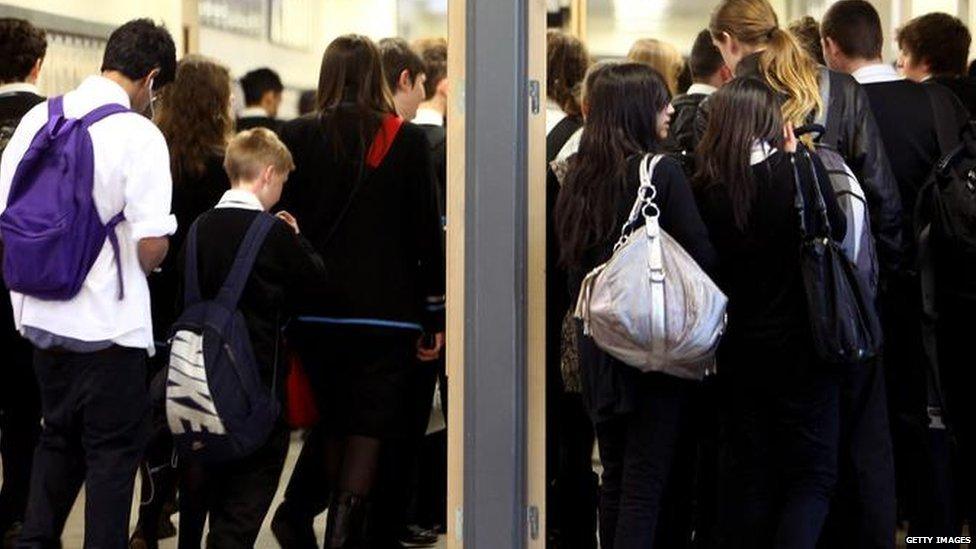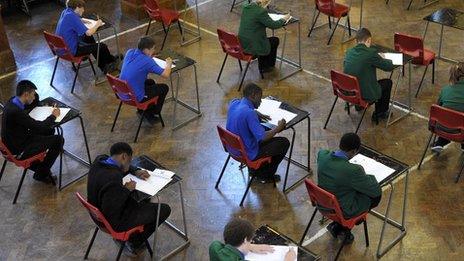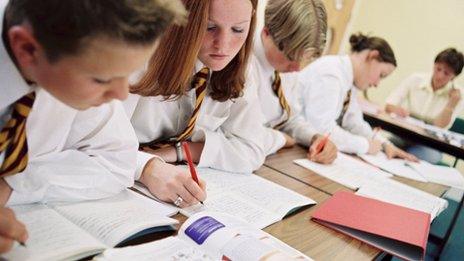New wave of super-size secondary schools planned
- Published

Demand for places is set to move from primary to secondary schools
Councils across England are planning a new wave of "super-size" secondary schools of between 12 and 16 form groups for each year, a report says.
At least 17 local councils will have these 2,000-plus pupil schools, the Times Educational Supplement found, external from Freedom of Information requests.
The schools are planned for both urban and rural areas, when pupil numbers reach a peak in the next few years.
The government said larger schools could produce very good results.
Schools minister Nick Gibb told the TES: "If you look at Shanghai, their schools are very large and they produce some very high standards of education."
One of Shanghai's top state schools, Shanghai High, has more than 3,000 pupils.
But Mr Gibb added: "The danger of creating schools too large is they may struggle to attract parents."
Analysis

The increasing size of England's schools in areas of high population pressure is not a new phenomenon.
Last year, there were 8.3 million pupils enrolled in schools - up by 1% on January 2013.
What this new data does tell us is how hard that increase, due to a rising birth rate - partly fuelled by past immigration, will hit secondary schools in the next few years.
The children who were in the beginning of the primary population bulge, in the early years of this decade, will soon be graduating to secondary school.
But the tight financial climate means councils simply do not have the cash to build lots of new smaller schools.
And limits to councils' ability to plan and build schools, because of the academy and free school programme, mean many have no choice but to add extra forms of entry to already existing institutions.
Some say that larger schools are better because they can offer a broader range of subjects.
But others fear children graduating from primary school will feel swamped by the switch to a 2,000-plus pupil institution.

He added that expansion must be balanced with whether the schools could be confident they could maintain good behaviour and good academic standards.
More subjects
Last month, it was reported that a 16-form entry school was being planned by Barking and Dagenham Council in east London to cope with a dramatic rise in pupil numbers.
The new figures show schools are being planned all over the country, as councils try to find more than 80,000 extra secondary places which they say will be needed in the next four years.
The rise in demand comes as a population bulge that sparked a shortage of primary school places is set to move to secondary schools in some areas.
Exmouth Community College in Devon is set to be one of the largest schools, with 2,860 students and 15 forms of entry on one campus by 2018. At present it has 2,400 students.
Head teacher Tony Alexander said the school had 163 full-time equivalent teachers, two staffrooms and four restaurant areas.
Where are they planned?

Barking and Dagenham - one 16-form entry school planned
Devon - one 15-form entry school planned
Southampton, Nottinghamshire, Central Bedfordshire, Croydon and Birmingham planning schools with 13 forms of entry or more
Warwickshire, Rotherham, East Riding of Yorkshire, Newcastle, Northumberland, Staffordshire and Brighton and Hove are planning schools with 12 forms of entry or more.

"Although there are some disadvantages to being such a large school, the advantages outweigh them," he said.
"We are able to provide a broad curriculum that other schools could not afford. And we have a wide range of children with different qualities and different attributes, which can only be good.
"The main disadvantage is that, as a head, I can't know all the children individually."
'Largest in country'
Walton High in Milton Keynes is set to expand to 16 forms of entry and 3,000 pupils over two sites.
And Bitterne Park School in Southampton plans to have up to 13 forms of entry by September 2017.
Head teacher Susan Trigger said the new school building would be "one of the largest in the country".
Malcolm Trobe, deputy general secretary of the Association of School and College Leaders, said school expansion did not tend to affect standards.
- Published12 June 2014

- Published14 March 2014
